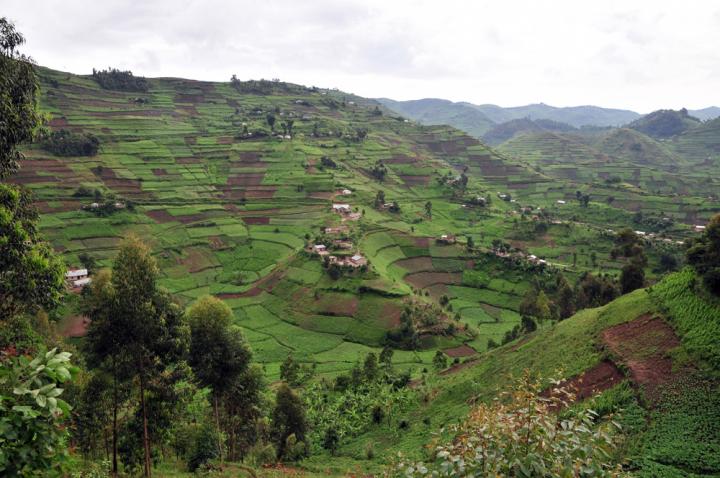Farmer input is essential to tackling global challenges of climate change, rural poverty and nutrition. A new data collection tool aims to build the biggest open-access dataset of its kind for development and research

Credit: Neil Palmer – International Center for Tropical Agriculture
Top-down projects for improving the lives of poor farmers were often unsuccessful because they didn’t systematically consider the diverse rural households survive and thrive. To tap this local knowledge, scientists and development agencies began surveying households to assure that research and development schemes were on target. But the surveys were not designed to be compared with one another, lacking what scientists call “interoperability” – meaning one organization’s household surveys could not be compared with another’s. For big-picture analysis, much of the data was of little use.
A team of CGIAR researchers began tackling the household survey interoperability problem in 2015. More than 13,000 standardized surveys and 21 countries later, they published their findings, methods and analysis of their massive dataset in February in Scientific Data, a Nature publication.
Moreover, they invited the global research-for-development community to contribute to the open-access dataset, which today includes more than 30,000 interviews conducted in 33 countries. (The publication only analyzed interviews through mid-2018.) Data is collected on tablets or smartphones, which can be solar powered for use in remote regions.
Broad adoption of this standardized survey tool may help guide international efforts to address smallholder challenges related to climate change, food security, nutrition, farm productivity, and social inclusion.
“The lack of standardization of agricultural household surveys, especially in international ‘agriculture for development’ research, has resulted in a proliferation of survey tools and indicators leading to datasets which are often badly documented, incoherent, and with limited interoperability,” the authors wrote. “The current state of affairs limits our ability to compare outcomes across studies and to draw general conclusions on the effectiveness of interventions and the trade-offs between outcomes.”
Researchers at the International Livestock Research Institute (ILRI) developed the tool, which they dubbed the Rural Household Multi-Indicator Survey, or RHoMIS. Other CGIAR co-authors included researchers at the Alliance of Bioversity International and CIAT, the International Institute for Tropical Agriculture, the International Maize and Wheat Improvement Center, and World Agroforestry.
“With this tool, we gain a consistent level of detail over a wide range of topics,” said Mark van Wijk, the lead author. “This allows us to look for system interactions that are observable in a wide diversity of locations, projects, cultures or climate zones.”
“Used to take months”
RHoMIS was built to collect raw data on 758 variables and create 41 indicators based on the data. Variables include household demographics and diets, farming practices related to livestock and crops, subsistence farming vis-à-vis farming for markets, fertilizer and pesticide use and yields, among many others. Key indicators produced span agricultural production and off-farm activities, including market integration, nutrition, food security, poverty and greenhouse gas emissions.
Along with being standardized, RHoMIS is flexible to include questions modules tailored to specific research projects. Surveys are taken on smartphones or tablets and can take as little as 40 minutes, compared with up to 3 hours for other surveys. The tool’s digital platform stores, aggregates and visualizes data for additional ease of use.
Development organizations, researchers and NGOs are already using the tool. RHoMIS has been used in climate-smart agriculture research in East Africa and Central America, changes in livelihoods and food security in Tanzania, mobile phone use for climate information in East Africa, and food security research in Central America’s dry corridor, among others. The NGO Tree Aid, which plants trees to help rural communities, uses RHoMIS as an essential part of its monitoring work.
“RHoMIS has allowed us to revolutionize the way we work with surveys,” said Jacob van Etten, a co-author and research director for digital inclusion at the Alliance. “A big benefit of standardization is that we don’t need laborious data management. We can jump from data collection to insights in a very short time, a process that used to take months. These insights can then directly feed into decision-making and start to improve our projects right away.”
Potential: biggest smallholder database
Understanding the diversity and dynamics of rural households is crucial, given the diverse effects of global changes in climate, population growth, urbanization, and food demand. Moreover, achieving the United Nations’ sustainable development goals – notably zero hunger – requires more intensified, sustainable food production and development of rural economies.
Reliable indicators at the farm-household level of both farm performance and household welfare are therefore needed to better understand and model these dynamics, and to inform the design and implementation of interventions by governments, donors, and international agencies, across a wide range of different geographies and socio-economic dimensions.
“Our goal is that in five years the RHoMIS-based dataset is the go-to place for information on smallholder farming,” said Wijk, adding that the tool will likely be useful to more NGOs and national statistics agencies. “By then, it will probably be the biggest single database on subsistence farming, with reliable information on productivity, management, poverty, food security, gender relationships and so much more.”
###
About the Alliance
The Alliance of Bioversity International and the International Center for Tropical Agriculture (CIAT) delivers research-based solutions that harness agricultural biodiversity and sustainably transform food systems to improve people’s lives. Alliance solutions address the global crises of malnutrition, climate change, biodiversity loss, and environmental degradation. The Alliance is part of CGIAR, a global research partnership for a food-secure future.
http://www.
http://www.
http://www.
Media Contact
Sean Mattson
[email protected]
57-311-784-7652
Related Journal Article
http://dx.




